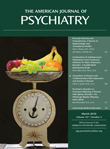Competing Interests
Dr. Fava has received research support or advisory, consulting, speaking, or publishing fees from Abbott Laboratories, Advanced Meeting Partners, Alkermes, Amarin, APA, Aspect Medical Systems, AstraZeneca, Auspex Pharmaceuticals, Bayer AG, Belvoir Publishing, Best Practice Project Management, Inc., BioMarin Pharmaceuticals, Inc., Bio Research, BrainCells, Biovail Pharmaceuticals, Boehringer-Ingelheim, BrainCells, Bristol-Myers Squibb Company, Cephalon, Clinical Trial Solutions, CNS Response, Compellis, Cypress Pharmaceuticals, Dov Pharmaceuticals, Eli Lilly, EPIX Pharmaceuticals, Euthymics Bioscience, Fabre-Kramer Pharmaceuticals, Forest Pharmaceuticals, Ganeden, GlaxoSmithKline, Grunenthal GmbH, Imedex, J&J Pharmaceuticals, Janssen Pharmaceutica, Jazz Pharmaceuticals, Knoll Pharmaceutical Company, Labopharm, Lichtwer Pharma GmbH, Lorex Pharmaceuticals, Lundbeck, MedAvante, Merck, Methylation Sciences, MGH Psychiatry Academy/Primedia, MGH Psychiatry Academy/Reed-Elsevier, NARSAD, National Center for Complementary and Alternative Medicine, National Institute on Drug Abuse, Neuronetics, NIMH, Novartis, Nutrition 21, Organon, PamLab, Pfizer, PharmaStar, Pharmavite, Precision Human Biolaboratory, PsychoGenics, Roche, Sanofi-Aventis, Sepracor, Schering-Plough, Shire, Solvay Pharmaceuticals, Somaxon, Somerset Pharmaceuticals, Synthelabo, Takeda, Tetragenex, TransForm Pharmaceuticals, Transcept Pharmaceuticals, UBC, Vanda Pharmaceuticals, and Wyeth-Ayerst; he has equity holdings in Compellis, has patent applications for "sequential parallel comparison of design" (SPCD) and for a combination of azapirones and bupropion in major depression, and receives royalties for the Massachusetts General Hospital Cognitive and Physical Functioning Questionnaire, the Discontinuation-Emergent Signs and Symptoms scale, and SAFER. Dr. Ostacher has received research support or advisory, consulting, or speaking fees from AstraZeneca, Bristol-Myers Squibb, Concordant Rater Systems, Eli Lilly, Forest Pharmaceuticals, GlaxoSmithKline, Janssen Pharmaceutica, Pfizer, and Massachusetts General Hospital Psychiatry Academy (lectures supported through Independent Medical Education grants from AstraZeneca, Eli Lilly, and Janssen Pharmaceuticals). Dr. Perlis has received research support or advisory, consulting, or speaking fees from AstraZeneca, Bristol-Myers Squibb, Elan/Eisai, Eli Lilly, GlaxoSmithKline, Pfizer, and Proteus Biomedical, and has equity holdings and patents for Concordant Rater Systems, LLC. Dr. Sachs has received research support or advisory, consulting, or speaking fees from Abbott, AstraZeneca, Bristol-Myers Squibb, Cephalon, CNS Response, Elan Pharmaceuticals, Eli Lilly, GlaxoSmithKline, Janssen, Memory Pharmaceuticals, Merck, NIMH, Novartis, Organon, Pfizer, Repligen, Sanofi-Aventis, Shire, Sigma-Tau, Solvay, and Wyeth; his spouse is a shareholder with Concordant Rater Systems. Dr. Nierenberg has received research support or advisory or consulting fees or honoraria from American Drug Utilization Review, American Society for Clinical Psychopharmacology, APA (travel expenses), Appliance Computing Inc. (Mindsite), Baystate Medical Center, Belvoir Publishing, Brain Cells, Inc., Brandeis University, Columbia University, Eli Lilly, Hillside Hospital, IMEDEX, MBL Publishing, MJ Consulting, New York State, NIMH, Novartis, PamLabs, Pfizer Pharmaceuticals, Physicians Postgraduate Press, PGx Health, Schering-Plough, Shire, SUNY Buffalo, Targacept, Takeda Pharmaceuticals, University of Texas Southwestern Dallas, University of Wisconsin, and University of Pisa; he is a presenter for the Massachusetts General Hospital Psychiatry Academy, which has been supported through Independent Medical Education grants from Astra Zeneca, Bristol-Myers Squibb, Eli Lilly, and Janssen Pharmaceuticals; he owns stock options in Appliance Computing, Inc., and Brain Cells, Inc.; through Massachusetts General Hospital (MGH), he is named for copyrights to the Clinical Positive Affect Scale and the MGH Structured Clinical Interview for the Montgomery-Åsberg Depression Rating Scale exclusively licensed to the MGH Clinical Trials Network and Institute; also through MGH, he has a patent extension application for the combination of buspirone, bupropion, and melatonin for the treatment of depression. Dr. Rosenbaum has consulted for or is a member of scientific advisory boards for Auspex, Medavante, Neuronetics, and Supernus, and he holds equity in Compellis and Medavante. Dr. Freedman has reviewed this editorial and found no evidence of influence from these relationships.

